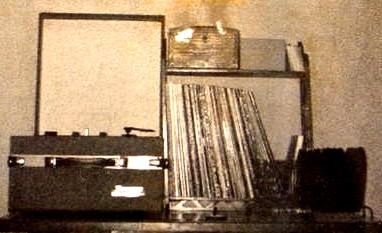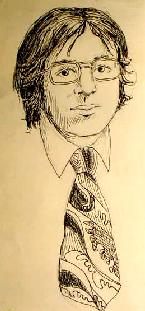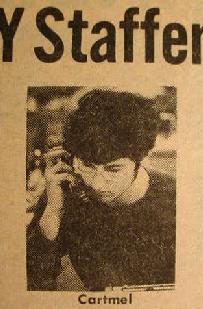What Will It Be, Record or CD?
(I wrote the following article for publication in a booklet distributed to the media and customers attending the Giant L/A Record Show in January, 1997. It was written primarily from the perspective of a record collector, not a record dealer. At least one of the predictions has already come true. And while several years have passed, the virtues of vinyl remain the same. However, one thing has changed. I finally broke down and bought that expensive, high end audiophile system that includes a Harman Kardon amplifier and Polk speakers.)
I'm a person who has several hundred CDs, and an even larger collection of record albums and 45s. I enjoy both formats. But if I had to choose between one or the other, I would select vinyl without hesitation. There are two basic reasons for making that choice - cost and selection. Right about now, someone is jumping out of his seat! "A lot of old records are outrageously expensive, and the major chains don't even sell vinyl anymore!"
I should point out that my musical tastes run along the lines of vintage jazz and pop vocals. Much of what I'm looking for can be found at yard sales, flea markets and from dealers who employ reasonable pricing habits. While it's true that compact discs outsell vinyl at the mall stores, it's exactly the opposite at the places I shop. Finding a stash of several hundred CDs for fifty cents apiece at a weekend yard sale is something I've never encountered.
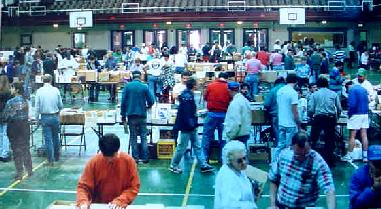
Between October, 1994 and November, 1999 I promoted 16 record collector shows in Lewiston-Auburn, Maine and Portsmouth, New Hampshire. This photograph was taken at our third event at the Lewiston Armory on April 15, 1995.
The major complaint I have with compact discs isn't the format itself, or even the price. I simply can't find a lot of the music I want on anything else but records. I'll be specific. I am a big collector of anything released by artists such as Frank Sinatra, Ella Fitzgerald, Della Reese, Tony Bennett, Sarah Vaughan, Louis Armstrong and so forth. Unfortunately, the major labels simply have failed to release the bulk of their recordings. Instead, their marketing strategies have focused on boxed sets and other collections, supplemented by only a handful of reissues of original titles. In my lifetime, I certainly don't expect to see the release of the complete discography of any of these artists on compact disc. In the case of some artists, many of the original recordings on tape probably don't even exist. Meanwhile, if Capitol and Reprise won't reissue everything in their Sinatra archives, you can imagine how selective they are with their other artists.
CDs are nice when you want to slap a stack of them on a carousel disc player and get about your business. And while some will disagree, they frequently sound better than their vinyl counterparts if only because they're missing the pops, scratches and hiss that are part and parcel for many old records. But finding albums in mint condition is a supreme joy. And having them to hold, with liner notes I can actually read without bifocals or a magnifying glass is wonderful. I don't like noisy recordings anymore than the next person. But a good diamond needle and a little extra care seem to work pretty well, assuming you have a decent copy to begin with. And when it's necessary and a better copy comes along, I simply upgrade. However, I think it's interesting that recently some contemporary artists have "inserted" artificial tape noise on their CDs - either for the novelty, or perhaps believing it appeals to the buying public.
On the subject of sound superiority, I've heard both arguments. One point of view states that analog recordings have a richer, warmer sound while digital recordings eliminate certain frequencies necessary for full-bodied listening pleasure. The other point of view says digital sound is free of distortion and offers a more precise reproduction of the original performance, while vinyl's reliance on direct contact between the surface and the stylus results in product degradation from the first playing. This article won't end the debate.
When confronted with the arguments, many of us fail to comprehend or appreciate them. Technically speaking, we don't speak “technicalese.” It reminds me of a story I read in Reader's Digest. A gentleman was shopping for his first CD player and asked the salesperson the meaning of "hybrid pulse D/A converter." He was informed it meant the machine will read the digital information encoded on the CDs and convert it into an audio signal - that is, into music. In other words, the CD player plays CDs. In that sense, it has a clear advantage over a record player.
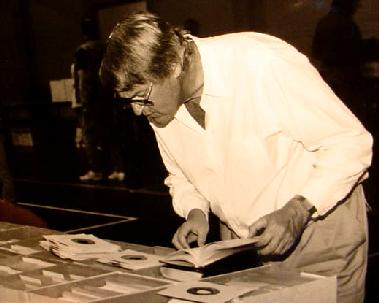
Maine Public Broadcasting Network personality Toby Leboutillier was a frequent customer at our shows. He is seen here loading up on 45s for his long-running oldies radio show "Down Memory Lane" that first hit the air in 1979.
Frankly, I'm not the one to speak knowledgeably about the clarity, quality or superiority of sound systems. I'm not a credible audiophile. I can't spew the technological jargon, produce the scientific formulas or provide the mathematical equations that are tossed about so freely in this debate. For one thing, I've never owned the type of stereo system that would enable me to make an honest evaluation. Second, I don't have the hearing of a dog. So there you have it. Why am I writing this article in the first place? I guess because I'm assuming that most people who attend our collector shows are more or less like me, and the choices we make between CDs and vinyl records are based on several considerations, not just sound quality. After all, if no one settled for less than perfection, we'd all have exorbitantly priced systems.
Speaking of features, each format has certain advantages over the other. A great option of most CD players is their programmability. Select your favorite songs, delete the Yoko tracks, and jump on the exercise bike. But other times playing disc jockey is more fun. Somehow I just can't get as excited sharing my favorite Mose Allison masterpiece on CD. For some reason, whether it's due to sentiment or snobbery, I prefer pulling out that 12-inch disc with the blue Prestige label from the original gatefold cover. This isn't some miniaturized high-tech clone. It's the real thing.
When it comes to preserving culture, tradition, or advanced civilization's little toys, nostalgia is relevant to a point. But we're not comparing the horse and buggy to a Ford Saturn. Vinyl records made a huge leap in their quality from the days of the Victrola and the Edison players. In terms of sound reproduction capabilities, the comparison between contemporary vinyl from the 1950s onward and the modern compact disc is so close that disagreements persist.
As I consider other advantages of records over CDs, several thoughts come to mind. When the turntable is thrown out, along with it goes the opportunity to sample an array of experimental, and yes weird, music from a previous era that will never find its way into the digital world. Also lost is the beautiful cover artwork that adorned so many treasures of the past. In the effort to pack more sound into a smaller space, the aesthetic virtues of vinyl are being forfeited. Turning yourself entirely over to CDs is not unlike reading a novel on your computer screen. The next step may be to download your music off the Internet. Also not to be forgotten are the pleasures of collecting 45 rpm discs and discovering them in their original picture sleeves. And finally, as an investment, I personally believe rare vinyl still holds an edge on its digital counterpart.
As I've already admitted, there are many times when I turn to the compact disc for my listening pleasure. But for me, it's the difference between driving an automatic and a stick shift. Sometimes I want to get where I'm going quickly - the rest of the time I'm drawn towards features such as style, control and originality. In those situations, you can have your Ford Saturn. I'll take the '57 T-Bird.

